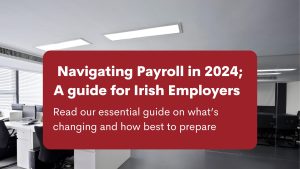The R&D tax credit scheme is a vital source of finance for developing Irish SMEs. The higher volume of Revenue Audits in this area has led to an increased level of uncertainly in recent years. For businesses relying on the credit as a source of funding, any uncertainly is significant.
The recently published Revenue guidelines are welcome and should result in more certainty for businesses claiming the relief. These new guidelines contain some clarifications on Revenue’s interpretation of the tax legislation, which can be broadly summarised as follows:
- Reduced scope for including overheads in a claim and
- Increased importance of R&D documentation to the activities
In relation to overheads, the guidelines are consistent with what we have experienced in more recent Revenue audits, with a narrower view on the allowable overheads that can be included in a claim.
The guidelines provide examples of overheads that Revenue does not consider to be qualifying expenditure, such as, “recruitment fees, insurance, travel, equipment repairs or maintenance, shipping, business entertainment, telephone, bank charges and interest”. Overheads associated with the employment of an individual e.g. HR costs, payroll team costs, canteen costs etc. are also not considered to be eligible.
The guidance on employee costs has been updated to provide more clarity. Pension contributions, bonus payments, health insurance and other items can be included. However, in the case of proprietary directors (or others with the capacity to directly control their own emoluments) payments out of line with normal practice will not be regarded as eligible.
With regard to outsourcing expenditure (which is subject to financial limits as to what can be claimed), the guidelines state that, “It is important to note that the outsourced activity must constitute qualifying R&D activity in its own right.” This can impact on certain categories of subcontracted activities that may be critical to the R&D process but which may not in themselves constitute R&D if examined in isolation.
Revenue has placed increased importance on the retention of supporting documentation that is contemporaneous and relevant. Revenue state that the “failure to keep such documentation may result in the claim for the R&D tax credit being disallowed”. However, this is coupled with Revenue’s recognition of a wider array of supporting documentation and alternative development methodologies.
R&D Revenue Aspect queries have become much more frequent in the past year or so. Claimants should be in a position to clearly respond to these Revenue queries in a timely manner as this is indicative of work having been undertaken prior to submitting the claim.
R&D Revenue Audits typically involve two separate reviews, a technical assessment and a financial assessment. The technical aspects can often be challenging. In this regard, it is essential that the most appropriate and qualified personnel are available on the day of the Audit, to explain the activities and deal with queries raised by Revenue. Relevant documentation, including diagrams, designs, drawings, emails, minutes, reports etc. should all be made available to the Revenue Auditor.
In summary, claimants must make an effort to track their qualifying R&D activities and related expenditure on a real-time basis, to ensure that their R&D claims can be robustly defended in the event of Revenue queries and Audits.





